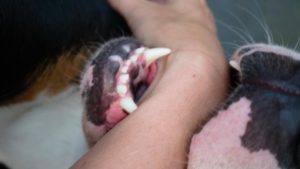Table of Contents
Dob bite prevention is crucial for the safety of children and adults in Tennessee. Dog bites can lead to bacterial infections and diseases, such as rabies, tetanus, noroviruses, salmonella, and other conditions that can lead to death.
Dog bites can cause tears, puncture wounds, bone breaks, and severe damage to muscles, tissues, ligaments, and tendons. Many victims have to live the rest of their lives with bite scars or undergo traumatic amputations of fingers or other body parts.
Dog bite victims might also have to deal with emotional trauma after a dog attack. Children are especially vulnerable to more severe injuries and wounds due to their fragility. If you or your child has been the subject of a dog attack, you should contact a dog bite lawyer in Tennessee right away.
A dog bite attorney can help you pursue justice for the harm incurred and ensure proper compensation for your injuries. These legal professionals are specialized in dog bite laws and know exactly how to litigate any claims. Here are some dog bite prevention safety tips for parents and children to consider for dog bite prevention.
Dog Bite Prevention – Safety Tips for Parents & Children
Teach Children Proper Behaviour

Many instances of dog bites can be avoided if children are educated on how to approach dogs. For example, children should never approach a dog without permission from the owner.
The dog’s owner usually knows if the dog is socialized with children, and can prevent the child from approaching a dangerous dog or mitigate their interaction. Children are naturally curious and might not understand certain situations, which is why it is essential to let them know that they shouldn’t disturb a dog while it’s eating, sleeping, or caring for its puppies.
In those situations, dogs are unpredictable because some dogs do not react aggressively if disturbed while others do so. Therefore, the best course of action is to be careful and mindful.
Encouraging children to avoid staring at dogs or making sudden movements that may startle them may also aid in dog bite prevention. Scared dogs may attack in retaliation in many cases. Teach children to be gentle and respectful when interacting with dogs.
Supervise Dog Interactions
Children are very unpredictable, and so are our canine friends. Because of this, it is always advisable to supervise young children when they are around dogs, even if it’s a family pet.
Do not leave infants or young children alone with a dog, no matter how well-behaved the dog appears. Dogs might bite when you pet them, and they might bite if they are in pain, if they are scared, or in other situations. Your child might accidentally hurt the dog, which might facilitate a bite unintentionally.
Just like cats, dogs also have sudden energy spikes and might run around aimlessly. However, due to their larger size, they can hurt children while running and jumping around.
Approach Dogs Safely

How your child approaches a dog makes a huge difference in all interactions. It’s important to teach children to approach dogs slowly and calmly, allowing the dog to sniff them before attempting to pet them.
Sometimes, approaching the dog from the side rather than head-on facilitates a better response. If your child runs towards the dog without warning, it might scare them, leading to a defensive reaction, which can result in biting.
If a dog is unaware of a child’s presence and the child approaches them from behind, the animal might get startled, which could also initiate an aggressive response. Although your household dogs might be more easily approachable, children should generally avoid approaching unknown dogs, especially if they are alone and unsupervised.
Respect a Dog’s Personal Space
Teach children to avoid hugging, kissing, or attempting to ride dogs. Encourage them to give dogs space when they show signs of fear, anxiety, or aggression. Different dog breeds react differently to certain actions. However, there is also the case of the dog being hurt, for example, and when your child tries to ride it or do something else, it might stimulate the dog’s pain, which can facilitate an aggressive response.
Caution Around Strange Dogs
It’s essential to teach children to never approach or pet unfamiliar dogs without the owner’s permission. Instruct them to avoid dogs that are growling, barking excessively, or showing other signs of aggression. It’s also important to note that not all barking dogs bite. More often than not, silent dogs are the ones that attack, which is why children need to have a general understanding of the dog’s body language.
Educate Children on Dog Body Language
Children can learn to understand basic dog body language cues, such as a stiff body, raised hackles, growling, or bared teeth. All of these factors indicate that a dog may be feeling threatened or uncomfortable, in which case, it shouldn’t be approached.
Report Aggressive Dogs

Teach children to inform an adult if they encounter a dog that behaves aggressively or makes them feel scared. Sometimes, children do not tell their parents of such encounters for various reasons. However, it’s important for them to do so because even if the incident didn’t result in dog bites, there’s no guarantee that it will not happen a second time.
Seek Professional Training
Consider enrolling in dog training classes to teach your dog proper socialization and obedience skills. Children who grow up with dogs generally develop a better understanding of their behavior, which can be helpful later in life. If a dog attacked you or your child, then you should consider taking legal action.
Dog Bite Claims
In Tennessee, there is a strict liability rule regarding dog bites, as dog owners are held strictly liable for any injuries caused by their dogs. However, if the injured person’s actions contributed to the incident, their compensation might be reduced according to their degree of fault. Consult a dog bite attorney if you have been bitten or attacked by a dog.
An attorney can help you navigate the legal process, gather evidence, and pursue fair compensation for your injuries and the other damages suffered.
Author Profile

Latest entries
 BusinessJuly 1, 2025Wills for Business Owners: Safeguarding Your Enterprise and Legacy
BusinessJuly 1, 2025Wills for Business Owners: Safeguarding Your Enterprise and Legacy Business TipsJune 6, 2025Confidence That Connects the Message
Business TipsJune 6, 2025Confidence That Connects the Message GamingMay 9, 2025Why AI Personalization Is Key for the Next Generation of Betting Platforms?
GamingMay 9, 2025Why AI Personalization Is Key for the Next Generation of Betting Platforms? Business StrategiesMay 1, 2025Key Business Development Strategies for Fostering Sustainable Growth
Business StrategiesMay 1, 2025Key Business Development Strategies for Fostering Sustainable Growth




